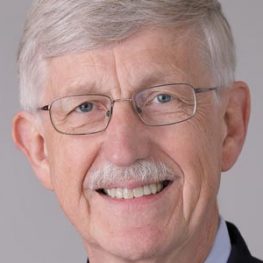NIH Launches Global Collaboration to Tackle SCD, HIV with Gene Therapies
October 24, 2019
The National Institutes of Health and The Bill & Melinda Gates Foundation will collaborate on developing durable and affordable gene therapies to cure sickle cell disease and HIV that can be used in sub-Saharan Africa within the next seven to 10 years.

Photo: NIH Director Francis Collins
Under the collaboration, NIH will invest at least $100 million over the next four years to develop gene-based cures for SCD and HIV and the Gates Foundation will make matching investments to make them globally available in resource-constrained countries. The ultimate goal is to scale and implement these treatments globally in areas hardest hit by these diseases.
Despite the advances that have been made in gene therapies, the NIH noted that these breakthroughs are largely inaccessible to most of the world because of their cost and complexity. To make these treatments effective and available for SCD and HIV, which disproportionately affect populations living in Africa or of African descent, new investment is needed to focus research on the development of curative therapies that can be delivered safely, effectively, and affordably in low-resource settings.
“This unprecedented collaboration focuses from the get-go on access, scalability and affordability of advanced gene-based strategies for sickle cell disease and HIV to make sure everybody, everywhere has the opportunity to be cured, not just those in high-income countries,” said NIH Director Francis Collins, “We aim to go big or go home.”
The NIH said the collaboration will align aggressive, high-reward research efforts to accelerate progress on shared gene-based strategies to cure SCD and HIV. Both organizations also will continue to invest in other parallel research efforts on cures for SCD and HIV outside of this collaboration.
“In recent years, gene-based treatments have been groundbreaking for rare genetic disorders and infectious diseases,” said Trevor Mundel, president, Global Health Program, at the Bill & Melinda Gates Foundation. “While these treatments are exciting, people in low- and middle-income countries do not have access to these breakthroughs. By working with the NIH and scientists across Africa, we aim to ensure these approaches will improve the lives of those most in need and bring the incredible promise of gene-based treatments to the world of public health.”
SCD and HIV are major burdens on health in low-resource communities around the world. Approximately 95 percent of the 38 million people living with HIV globally are in the developing world, with 67 percent in sub-Saharan Africa, half of whom are living untreated. Fifteen million babies will be born with SCD globally over the next 30 years, with about 75 percent of those births occurring in sub-Saharan Africa. An estimated 50-90 percent of infants born with SCD in low-income countries will die before their fifth birthday and SCD is identified as the underlying cause of about one in 12 newborn deaths in sub-Saharan Africa.
The collaboration will identify potential candidate cures for SCD and HIV for pre-clinical and clinical evaluation, co-funded by the NIH and Gates Foundation. It will then define long-term opportunities to work together and with African partners on advancing promising candidates to late-phase clinical trials, with funding to be determined as candidates progress.
To achieve the goals of the collaboration, both projects will require new delivery systems that can get prospective therapies to the right places in the body and optimize treatments to target the cells involved in the respective diseases efficiently and specifically. For SCD, that would mean repairing or compensating for the mutations in hemoglobin that cause SCD in hematopoietic stem cells. For HIV, that would mean targeting the reservoir of proviral DNA that continues to lurk inside a small number of cells, even after many years of effective antiviral treatment.
“We are losing too much of Africa’s future to sickle cell disease and HIV,” said Matshidiso Rebecca Moeti, regional director for Africa, World Health Organization. “Beating these diseases will take new thinking and long-term commitment. I’m very pleased to see the innovative collaboration announced today, which has a chance to help tackle two of Africa’s greatest public health challenges.”
Author: Rare Daily Staff

Stay Connected
Sign up for updates straight to your inbox.
